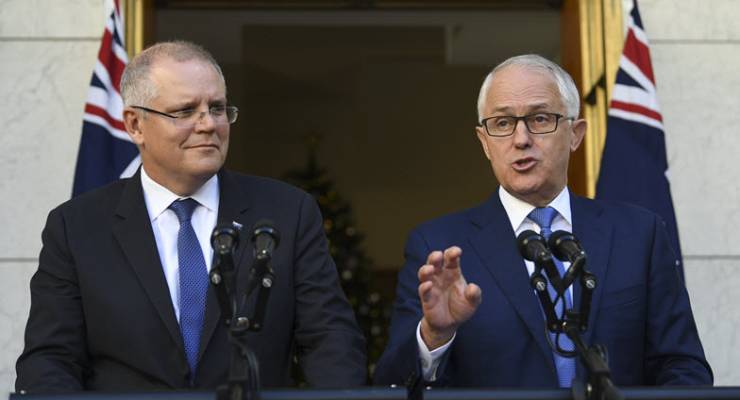
In the end it needed to a letter from the banks themselves to allow Malcolm Turnbull to accept the inevitable and set up a royal commission into the banks — or what the Prime Minister called “misconduct in the financial services industry”. At 8.30 this morning, the big four banks released a joint letter to the Treasurer calling for an inquiry into themselves, arguing:
… It is now in the national interest for the political uncertainty to end. It is hurting confidence in our financial services system, including in offshore markets, and has diminished trust and respect for our sector and people. It also risks undermining the critical perception that our banks are unquestionably strong … We now ask you and your government to act to ensure a properly constituted inquiry into the financial services sector is established to put an end to the uncertainty and restore trust, respect and confidence.
Nationals backbenchers were ready to deliver a parliamentary inquiry next week and even Deputy PM Barnaby Joyce was leaving open the possibility of a full-scale revolt by the Nationals against the government’s policy. But that, ostensibly, wasn’t enough to convince the PM to surrender — the banks themselves had to give permission for an inquiry. Not that the government was trying to confirm Labor’s claim that the Liberals are in thrall to the banks or anything.
Even so, and despite the headlines about backflips — 24 hours ago the government was still determined to do everything it could to prevent an inquiry — the decision is the less worse option for Turnbull, who no longer faces the nightmare scenario of losing on the floor of the House on the issue and having an inquiry foisted on him. It also removes major political irritant between the government and Nationals MPs that should make things in the joint party room a little calmer when it meets next week.
Treasurer Scott Morrison attempted to gain cover on the backflip by saying the governor of the Reserve Bank and the chair of the Australian Prudential Regulation Authority had advised him of the damage being caused by the speculation — much of which was entirely the product of the government itself and its inability either to control the House of Reps, or its own restive backbenchers.
By 10.30am investors has signalled their verdict: bank shares were down sharply — CBA shares off 2.2%, Westpac 1.7%, ANZ 1.3% and NAB 1.2%. The fact that the CBA’s loss was the largest was an immediate judgement that it has to most to lose from any inquiry with its long history of dudding customers, consumers and regulators (as per the Austrac money-laundering case). The wider market was down more than 50 points, with most of that due to the slump in bank shares.
And while we haven’t seen the terms of reference yet, note the Prime Minister’s use of the term “misconduct in the financial services industry”. The inquiry will almost certainly include an attempt to go after trade unions via industry superannuation funds, despite the constant and significantly better performance by industry super over bank-owned retail funds. The line will be that industry super payments to unions to market funds, and directors’ fees to union-appointed directors (which are a sinister flow of funding to unions if the director passes them onto their union, or typical union venality if the director keeps the fees for themselves instead), are on a level with major banking scandals and require investigation.
The problem is, the commission will be awfully busy: it’s supposed to start in February and only run for 12 months. The political reality that forced the government to embrace the inquiry may well force it to be extended.








Dear Malcolm,
We are unhappy with the proposed Terms of Reference for upcoming Commission of Inquiry, and demand a Royal Commission with watered down Terms Of Reference.
Yours Sincerely,
The Banksters
“We now ask you and your government to act to ensure a properly constituted inquiry into the financial services sector is established to put an end to the uncertainty and restore trust, respect and confidence”.
ie, go through the motions. Just don’t look too hard.
They think that speculation about a Royal Commission is doing harm to the confidence in the finance sector?
Perhaps the lack of confidence is that people have seen the many scandals that have hit the sector in the past few years.
So now it’s just down to their government to funnel the terms of reference – and ultimately allow the banks access to the prceeds of industry super funds?
“… the proceeds of …. “
So glad the banks have allowed Mr. Turnbull to agree to a Royal Commission into Banking. Will the banks be writing to the LNP with their preferred terms of reference? I, with many others would like to know just what powers our governments have. It seems to me that banking , oil, pharmaceuticals and other large multi nationals write their own terms of reference. Fed up of the whole political culture.
As Shorten himself said, it took the Banks to give direction for Turnbull to OK a Royal Commission.
Malcolm is always ready to do corporate bidding like the good little doggy he is. When the consumers wanted it, the RC issue was refused.
Nudiefish -EXACTLY. Malcayman was blind to the tragedy of hundreds of thousands of Australians losing their livelihoods due to the new banking bastardry. Only in recent times has it been portrayed as acceptable for banks to care little for their customers, and create and pursue management/staff bonus’s and consecutive record annual profits.
Adele Ferguson SMH and ABC’s Four Corners have attempted to give industry whistle blowers some ….air. Let’s hope whistleblowers get a fair hearing in the Commission.
And people wonder why consumers are turning to bitcoin in order to cut banks out of the their own personal financial system.